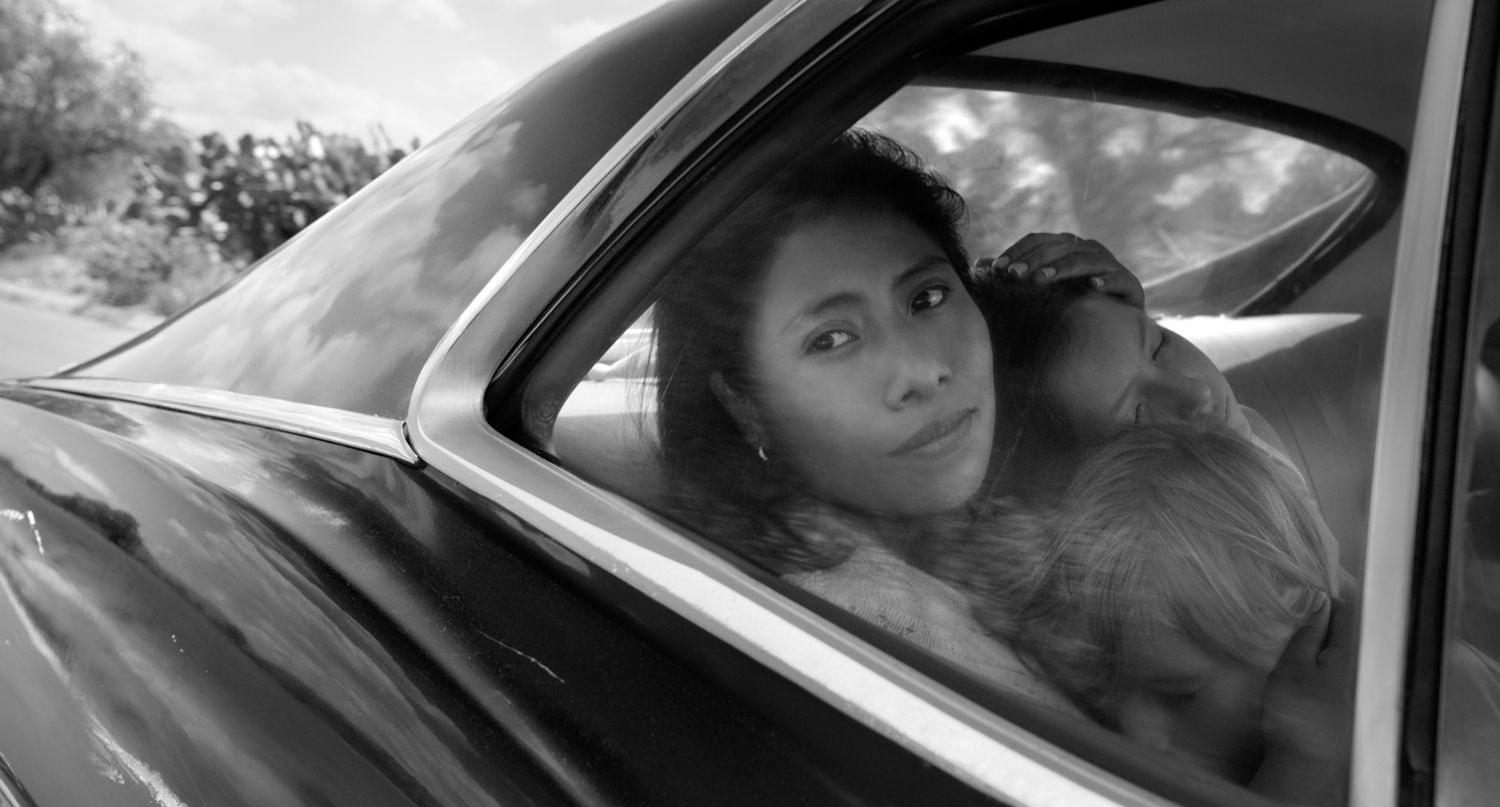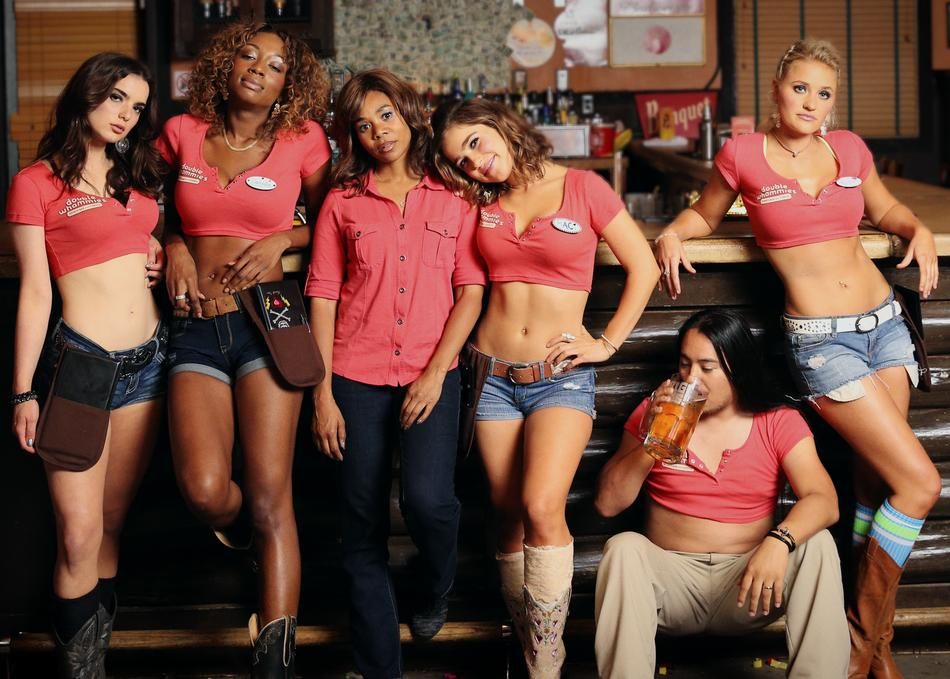There's a quiet, gentle ironic counterpoint in Roma, a movie with two largely separate plot lines that nonetheless intersect for the simple reason that they're taking place in the same home. We follow the quotidian life of a maid (Yalitza Aparicio) for a well-to-do family in 1970s Mexico City. She does the cleaning and the washing and the cooking and the childcare as a beloved but backgrounded auxiliary member of the family. She's constantly told she's valued, but just as easily snapped at if there are, say, dog droppings in the driveway. Her personal life is a struggle, with a shiftless boyfriend who flees the instant she's pregnant, with no means to grow beyond her current economic and social standing, with an impoverished background, and with her hard job done for pennies, room, and board. And yet she keeps this struggle mostly to herself, cautiously maintaining good relationships with her co-workers and employers, genuinely loving the children in her care, and rarely allowing her turbulent emotional struggles to manifest as anything more than a deep sadness in her eyes. (Aparicio, in her first acting role, is quite good at showing this emotion flashing up and getting pushed back down.) The irony is that the family's troubles are less dramatic, and yet they act them out as melodrama -- a cheating father, shouting wife, wiggly kids, busted cars, screaming matches, and even a smack or two -- erupting in their normal daily routines. By setting these two approaches to life's struggles side by side, writer-director Alfonso Cuaron almost seems to be tiptoeing to the edge of saying only privileged people have the luxury of wallowing in misery. And yet this isn't a cruel movie, partially because it's gooey where it could be sharper, vague sentiment passing off as profound distance.
Still, though he takes all the characters seriously, he imbues the maid alone with a quiet dignity. It locates the sweetness in the family's genuine love for her, while aware of how quickly she becomes just the hired help when need be. It's small. And yet the movie's an epic in the background even as it's an intimate slice-of-life drama in the foreground. A widescreen, black and white, period piece gleam to the images take in convincing city streets that seem to stretch for miles with every detail of a time and place just so. Cuaron's camera roves like Altman crossed with Lucretia Martel, catching snippets of dialogue in languid specificity, in long sequences as situated on place and deep focus as character or incident. Marvelous scenes like an extended Christmas party, or a trip to the movies, luxuriate in the vivid recreation of a warmly remembered space. Historical events -- an earthquake, a protest -- play out not as momentous reenactments, but as just another thing with which to put up between the other daily dramas. After nearly two decades working in big-budget genre fare (his Prisoner of Azkaban, Children of Men, and Gravity are some of the finest soulful spectacle around), Cuaron has painted a more autobiographical vision in his typical virtuoso style. Even so, there's a curious quality that leaves the film, as accomplished as it is, as more of an impression than a statement, a remove from its main character that views her with sympathy without ever quite understanding her. It mistakes depiction for comprehension, a strong silent stereotype for a complicated interiority, a virtue of presence counterbalanced by a deficit of interpersonal imagination. Thus it's a movie full of abundant visual and aural pleasure and emotional distance.
That's not a problem with 2018's other movie about working class women, Andrew Bujalski's Support the Girls. It may be less high profile, smaller in scale, and lighter in tone. But it's an even more serious effort of moral conscience and class consciousness. That it's somehow both unblinkingly candid about modern working class socioeconomic conditions, and a buoyant, charming workplace comedy filled with indelible characters, is a delight. It's set almost entirely in a small, independent Hooters-style sports bar and grill where the waitresses wear tight shirts and short shorts revealing acres of midriff and legs. The little place is ignominiously nestled in a homogenous suburban Houston sprawl, overseen by a warm, compassionate, no-nonsense manager (Regina Hall). During one eventful day, she tries to wrangle new trainee waitresses, deals with the restaurant's overbearing owner, maneuvers through a crowd of regulars and rowdy, ogling one-timers, and works to keep her longtime employees safe and happy. She knows the establishment isn't the fanciest or classiest, but doesn't look down on the hard work they put into the place. As she charges through a normal, tough day at work (it starts with her crying in her car, before literally putting on a happy face) she's determined to treat her employees like family, loving and supporting but able to be tough when necessary. The picture is a scrappy, expertly multitasking, bighearted, intimate comedy with finely textured notes of drama, spinning a small, tightly knit ensemble through the ups and downs of a day. And putting Hall in the center is its best decision, allowing her sweetness and her toughness to lend her easy authority and warm respect. It's clear why her waitresses love her. And why the grind of it all could get her down.
In Bujalski's style, unassuming humane generosity of spirit, every member of the ensemble emerges as a full formed, fully seen human being with wants and needs and rich emotional complications steadily revealed through action. There’s the woman (Shayna McHayle) who needs to bring her son to work until she can find a sitter. There’s the bubbly cheerful waitress (Haley Lu Richardson) who tries to keep the group's spirits up simply because she radiates kindness that's also it’s own sort of need. There’s the girl (AJ Michalka) who has regrets over how a new prominent tattoo will effect her employment. There's the woman (Jana Kramer) whose sudden financial troubles (to say the least) prompts the manager to throw an emergency car wash fundraiser. There's the grumpy, prejudiced owner (James Le Gros) who is exasperated by the drama. To this, Hall replies, "you want me to tell a group of 20-year-old girls no drama!?!" They will be who they'll be, and are worthy of love and understanding for no reason other than their humanity. In its low-key way, the movie makes an earnest observation about what a difference it makes when someone actually cares, and how difficult it can be to maintain that core goodness when some around take advantage or otherwise bring you down. So bright and clear-eyed, and at once loose and bubbly and totally serious-minded, the movie emerges as a sweet and melancholy day-in-the-life of tenuous minimum wage workers that genuinely sees and supports its characters, centering their stories and prioritizing them. It knows they can only laugh along for so long until they need a good cathartic scream into the void.



No comments:
Post a Comment